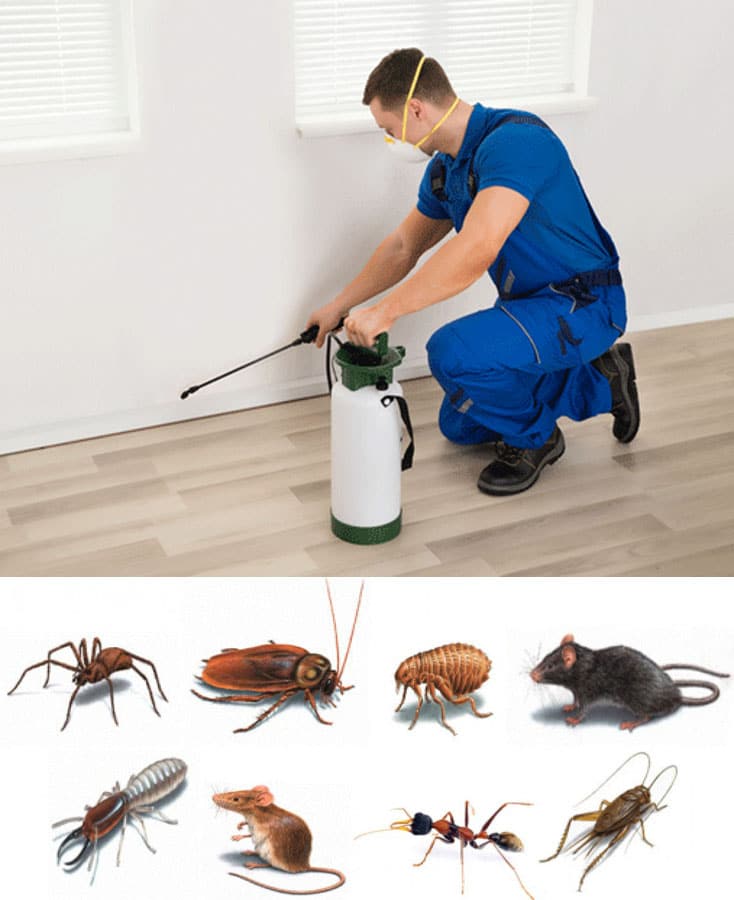Safe and Reliable Parasite Control for Lasting Defense
Reliable bug monitoring calls for a complex technique that stabilizes environmental integrity with the requirement for efficient parasite suppression. The nuances of these approaches might not be immediately clear, motivating a closer examination of the methods that can lead to lasting parasite control end results.
Recognizing Parasite Control Approaches
Bug control encompasses a variety of techniques focused on managing and eradicating unwanted pests and rats that can endanger both health and property. Recognizing these techniques is vital for efficient bug management.
The primary categories of pest control approaches include mechanical, organic, and chemical methods. Mechanical approaches involve physical barriers and traps to stop parasite access and capture undesirable varieties. Utilizing screens on home windows or using sticky catches can significantly lower pest populaces without presenting damaging substances - exterminator coquitlam.

Chemical parasite control is often one of the most identified technique, making use of chemicals to eliminate insects. These chemicals can be efficient however must be used with caution to prevent unfavorable results on non-target varieties and the setting.
Advantages of Eco-Friendly Solutions
Exactly how can eco-friendly options transform bug control practices? The adoption of environmentally friendly parasite control methods offers various benefits, dramatically improving the effectiveness and safety of insect administration (exterminator coquitlam). Firstly, these options use all-natural components, minimizing the dependence on hazardous chemicals that can present dangers to human wellness and the environment. This shift not only protects family members and animals but likewise decreases the capacity for dirt and water contamination.

Another advantage is the favorable effect on regional biodiversity. Green services are created to target details pests while preserving helpful pests and wildlife, promoting a balanced environment. This strategy lines up with the expanding customer demand for sustainable practices, improving the track record of insect control service providers.
Integrated Bug Monitoring Approaches
The implementation of environment-friendly services normally results in the fostering of Integrated Pest Administration (IPM) approaches, which better improve insect control effectiveness. IPM is an all natural technique that integrates numerous tactics to manage bug populaces while reducing environmental impact. This technique highlights using organic, cultural, mechanical, and chemical controls, ensuring a sustainable and well balanced approach of parasite monitoring.
One essential aspect of IPM is the complete analysis of pest task and environmental problems. By keeping track of parasite populaces and determining their life cycles, professionals can execute targeted interventions that interfere with the pest's habitat or lifecycle, minimizing dependence on chemical pesticides. Furthermore, social practices such as plant rotation and environment control can dramatically diminish insect facility and recreation.
Another important part is making use of biological control agents, such as advantageous pests or microbes, which can naturally subdue insect populaces. When chemical applications are needed, IPM prioritizes making use of low-risk pesticides and applies them selectively, minimizing direct exposure to non-target organisms and people.
Including IPM strategies not just improves bug control effectiveness yet also promotes a safer ecological community, aligning with the expanding need for sustainable methods in parasite management.
Safe Practices for Homeowners
Recognizing the importance of risk-free techniques in pest control can equip house owners to successfully take care of pest problems while guarding their health and the environment. Applying preventative actions and non-toxic techniques is crucial in reducing direct exposure to unsafe chemicals.
Home owners should first assess their environment for problems that bring in bugs, such as standing water, food, and clutter waste. Regularly cleaning and securing entrance points can prevent bugs from getting into the home. Utilizing natural deterrents, such as essential oils or diatomaceous planet, can supply efficient options to chemical pesticides.
When chemical treatments are required, homeowners should choose products that are specifically identified as safe for residential usage. It is important to comply with application standards thoroughly to prevent too much exposure. Utilizing targeted treatments in locations where pests are recognized, rather than blanket splashing, can substantially reduce chemical usage.
Lastly, preserving open communication with parasite control experts is vital. he said House owners ought to make inquiries about the safety and security of products made use of and request eco-friendly choices whenever feasible. By adopting these secure techniques, property owners can develop a healthier living atmosphere while properly managing pest concerns.

Tips for Long-Term Protection
Establishing a pest monitoring technique that highlights lasting protection can considerably boost the performance of the safe practices previously gone over. To achieve this, homeowners ought to carry out normal evaluations of their residential property, focusing on hidden areas such as attics, basements, and crawl spaces. Our site Early discovery of parasite activity is essential in stopping invasions from holding.
These techniques minimize attractants that draw pests right into the home. Securing entrance points, such as cracks around home windows and doors, can successfully block prospective insect gain access to.
Landscaping needs to also be taken into consideration; maintaining plants cut and keeping a range in between vegetation and the home reduces hiding areas for parasites. Utilizing natural deterrents, such as crucial oils or diatomaceous planet, can further prevent infestations without considering severe chemicals.
Lastly, collaborating with a specialist insect control solution for regular analyses can supply an extra layer of safety and security. These experts can use tailored suggestions and progressed treatments, making certain that your home stays secured against pests in the lengthy term.
Final Thought
In verdict, safe and trusted bug control needs a complex method that highlights environmentally friendly techniques and incorporated bug management. By applying natural deterrents, carrying out routine examinations, and maintaining appropriate cleanliness, residential or commercial property proprietors can significantly decrease bug populaces while protecting advantageous bugs and the atmosphere. Collaboration with expert parasite control services improves the efficiency of these pop over to this site methods, making certain customized solutions that supply enduring defense and satisfaction against future infestations.
Effective pest management calls for a complex method that balances environmental stability with the requirement for efficient insect suppression. The adoption of green parasite control approaches uses many benefits, substantially improving the efficiency and safety of pest management.The implementation of eco-friendly solutions normally leads to the adoption of Integrated Insect Management (IPM) methods, which additionally enhance pest control efficiency. exterminator coquitlam. By monitoring parasite populaces and determining their life cycles, practitioners can apply targeted treatments that interrupt the pest's environment or lifecycle, minimizing reliance on chemical pesticides.In verdict, risk-free and reputable bug control requires a complex method that emphasizes environment-friendly approaches and integrated pest monitoring